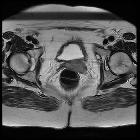primary vulval cancer


Primary
vulval cancer • Primary vulval carcinoma - Ganzer Fall bei Radiopaedia
Primary vulval cancer is a rare gynecological malignancy that originates from the vulva.
Epidemiology
It accounts for ~3-5% of female genital tract malignancies and typically presents in postmenopausal patients peaking around the age of 65-70 years of age .
Pathology
The commonest histological type by far is squamous cell carcinoma which account of ~80-85% of cases . The tumor commonly involves the labia majora and minora.
Risk factors
- vulval intraepithelial neoplasia: considered a precancerous condition
Radiographic features
MRI
Particularly useful in accurately assessing the size (up to ~80 accurate ) of vulval lesion and assessing groin lymph node metastasis
Signal characterisitcs include:
- T1: low to intermediate signal
- T2: typically intermediate to high signal
Staging
The FIGO staging system is commonly adopted: see vulval cancer staging
Differential diagnosis
Considerations (particularly when lesions are large) include:
- vaginal carcinoma with vulval extension
- cervical carcinoma with vulval extension
Siehe auch:
und weiter:

 Assoziationen und Differentialdiagnosen zu Vulvakarzinom:
Assoziationen und Differentialdiagnosen zu Vulvakarzinom:

